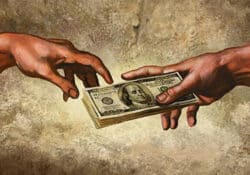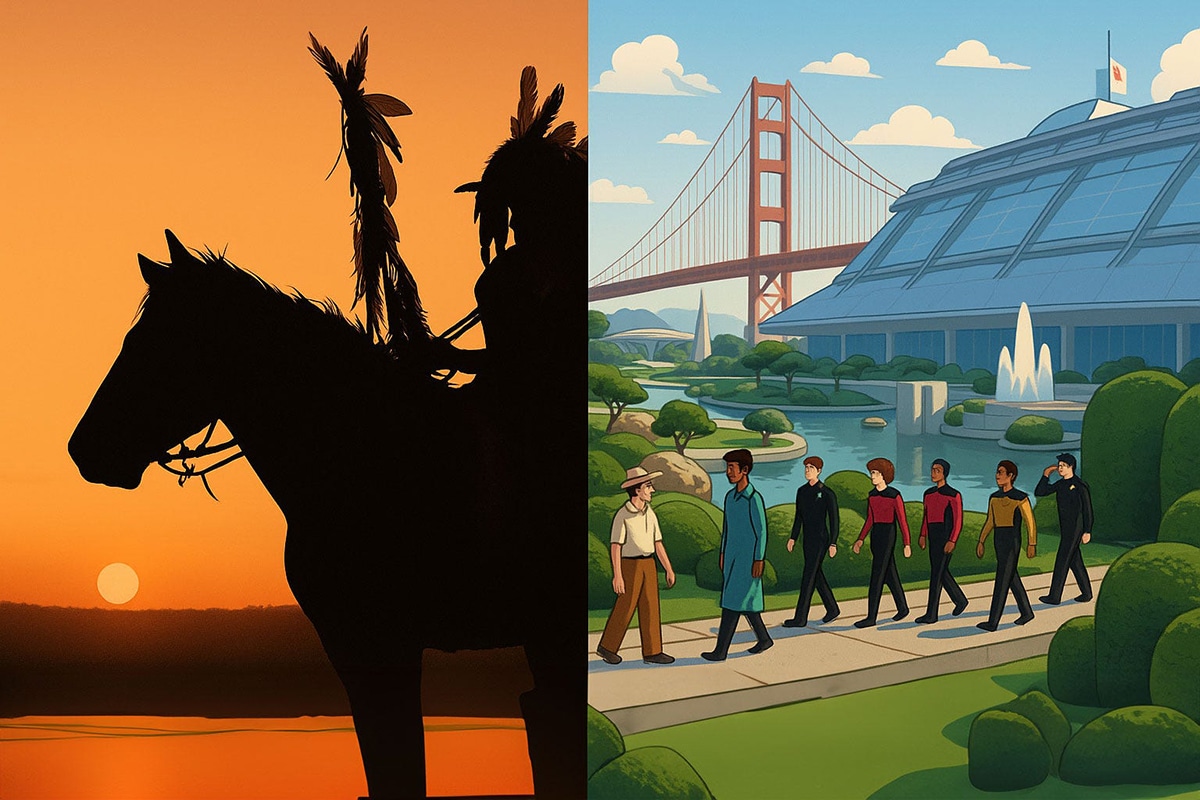

The Myth of the Autonomous Human
by Justin McAffee | Jun 22, 2025
Since we’ve been exploring the myths that keep us compliant to a system designed to serve capital and control, I thought I’d share one that’s been on my mind — and under my skin. It follows the same framework as The Ten Myths of Progress, though it didn’t make the first volume. Maybe it should have. Maybe it will end up in the second. Either way, it’s a big one — one that shapes how we see ourselves, our communities, and our place in the world.
So, I’m opening this one up to all.
Because the myth of the autonomous human might be the most foundational lie of all.
“Madness is rare in individuals – but in groups, parties, nations, and ages it is the rule.” -Friedrich Nietzsche
The False Binary of Individualism vs. Collectivism
Neoliberalism masquerades as individualism while enforcing market conformity. You’re told you’re free — as long as you participate in the market, brand yourself, and perform productivity on cue. Your “choices” are managed, your “freedom” is measured in consumer options, and your “self” is a product in a competitive economy.
Industrial collectivism, on the other hand, promises solidarity but demands obedience. It calls for unity, but only through submission to centralized authority. Your identity is absorbed into the role assigned by the group, the party, the plan.
Both demand surrender. One to profit. The other to party. Both to control.
We’re told these are our only choices: hyper-individualism or total conformity. Isolation or assimilation. But this is a false binary — a myth designed to erase any vision of autonomy rooted in relationship, or community grounded in respect and reciprocity.
The autonomous human of liberal mythology is a fiction. So is the collectivist ideal of the obedient mass. Both erase the relational, situated, moral self — the one that resists, remembers, and belongs.
Myth Origins and Cultural Embedment
The binary between individualism and collectivism has more ancient roots than modern political philosophy would admit. It is not a natural tension but an artifact — a byproduct of civilization itself.
The agricultural revolution was the beginning. As humans settled, accumulated surplus, and began to shape landscapes for permanent control, a shift occurred — not just in food systems, but in worldviews. Kin-based, reciprocal societies gave way to hierarchies, castes, property, and the first bureaucracies. This shift birthed new categories: ruler and ruled, producer and priest, man and nature, self and other.
The civilizational mindset split the world into managers and managed. The self, once a node in a vast ecological web, became a subject — of the state, the god-king, the economy. Relationships were transformed into roles. Autonomy was no longer interwoven with land and kin, but redefined as power over others — or obedience to the system.
This myth was refined in every empire:
- Rome, where citizenship conferred rights to individuals, but only through allegiance to the imperial machine.
- Feudal Europe, where one’s identity was determined by class and submission to the divine hierarchy.
- Confucian bureaucracy, where harmony was enforced through role-based duty and moral performance.
What Enlightenment Europe did — and what neoliberalism perfected — was to dress this civilizational control in the language of freedom. Capitalism took the civilizational idea of the abstract, obedient self and reframed it as the rational, self-interested individual. Collectivist revolutions reabsorbed the self into the abstraction of the “people.” Both evolved from the same root: a deep distrust of real, relational autonomy — the kind that emerges when people live close to land, each other, and their own agency.
This myth has become total. It is embedded in:
- Law: where corporations are granted personhood, while ecosystems are not.
- Education: where students compete as atomized units to serve future economies.
- Urban planning: where isolation is the norm, and community is an afterthought.
But more profoundly, it is embedded in our imaginations. We struggle to even conceive of autonomy without disconnection, or belonging without coercion.
And that is the triumph of this myth — not that it rules us, but that we think it’s all there is.
Challenging the Narrative
“Freedom Without Autonomy”
Look at the stories we’re told about freedom. The slogans, the self-help books, the career workshops. You are your own brand. You are responsible for your outcomes. You are free. Some even feel this is empowering.
But this freedom is carefully managed.
You are free to choose your career — as long as you don’t question the economy. Free to speak — as long as you don’t disrupt. Free to vote — between candidates who both swear fealty to the same system.
This is not autonomy. It’s choreography.
And the myth of the autonomous human is the script.
Because what does this myth really do?
It trains us to internalize control. If you succeed, you earned it. If you fail, you didn’t try hard enough. If you’re unhappy, try a productivity hack or a mindfulness app. The myth turns structural exploitation into personal failing. It converts systemic isolation into a badge of honor. It keeps you blaming yourself — instead of asking who built the system that isolates and exploits you.
At the same time, the myth discourages collective resistance. If everyone is supposed to be self-sufficient, then no one owes anything to anyone else. Mutual aid looks like weakness. Solidarity looks like laziness. Asking for help becomes a moral failure.
But if you seek connection — if you long for something deeper — the system has another trap: collectivism without autonomy. The team. The party. The cause. In this version, your value comes from how well you conform or serve the cause. You’ll find purpose, but only by suppressing dissent, softening your edges, and serving the whole.
The result? In both models, your personhood is conditional. You are not free — you are formatted.
Because real autonomy isn’t about doing whatever you want. It’s about living in right relation — to yourself, to others, to place, to time. It’s about the power to say no — to what harms you, exploits you, or violates your values. And it’s about the power to say yes — to what nourishes, connects, and sustains.
But that kind of autonomy is dangerous. To the market. To the institution. To the plan.
So we’re given a different version.
A freedom of performance.
A belonging of obedience.
And it’s all wrapped in the myth: this is as good as it gets. Don’t resist. Don’t imagine. Just choose your role — and be grateful you have one.
But what if these aren’t real choices?
What if both paths serve the same system?
And what if real freedom doesn’t mean standing alone — or fitting in — but standing in relation, as a full human being?
Lived Consequences
“Alone in a Crowd”
I’ve felt this myth in my chest before I had words for it.
I grew up surrounded by messages that told me to be my own man. Be strong. Be independent. Don’t rely on anyone. Don’t be a burden. Don’t need too much. But also: achieve. Impress. Succeed. Compete. Win.
It was supposed to be freedom.
But it felt like pressure.
Like loneliness dressed up as selfhood.
Have you ever felt this going to a job interview? I remember arriving, résumé in hand, flanked by others doing the same thing — trying to look polished, confident, exceptional. All of us selling the same dream of individual success. All of us desperate for a slot in a system we don’t control. No one looked at each other. No one smiled. It felt like we were ghosts.
I’ve seen people crack under that pressure — working three jobs to survive, skipping sleep to stay ahead, mistaking exhaustion for virtue. I’ve watched friends withdraw into self-help spirals, trying to “fix” themselves in order to fit into a world that was breaking them. I’ve watched men implode in isolation, told they couldn’t cry, couldn’t ask for help, couldn’t name the ache they felt every day.
And I’ve felt it myself — the shame of needing, the guilt of resting, the fear of slowing down. The way solitude starts to sting when it’s not chosen, when it’s built into every part of your day. The way community can feel like a performance, like everyone’s playing a role and no one’s being held.
The myth tells us we’re autonomous — but we’re not.
We’re isolated, not independent.
We’re managed, not sovereign.
We’re surrounded by people, and still feel alone.
And when we do seek community — we’re often handed a script. Join the team. Believe the mission. Align with the message. I’ve watched people give themselves away to movements, churches, companies, causes — only to be chewed up and left behind the moment they questioned, faltered, or didn’t fit the mold.
So we toggle between loneliness and conformity, performance and silence.
Freedom becomes performance.
Belonging becomes obedience.
And what’s lost is everything that makes us whole:
- The friend who doesn’t need you to hustle.
- The elder who holds silence with you.
- The land that asks for no résumé.
- The truth you speak without permission.
- The body that doesn’t want to optimize — it wants to rest.
I’ve felt the hunger for real connection — the kind not mediated by money or ideology, but made of eye contact, grief shared, laughter held, presence offered. The kind of connection the system can’t package or sell.
And I’ve realized: the myth isn’t just wrong. It’s cruel.
It sets us against each other, against the land, and against ourselves — until we forget that we were never meant to do this alone. Until we believe we are only as worthy as our output, only as safe as our silence.
But the truth is, we already belong.
We were born belonging.
And the only thing we ever needed to be free was each other.
Alternative Visions
“Relational Autonomy”
Real autonomy isn’t about isolation. It isn’t about domination.
And it sure as hell isn’t about branding your trauma and calling it strength.
It’s about relation.
In many Indigenous and land-connected cultures, the self is not an island. Instead the self is part of a living web. Here, identity is not found in separation, but in relation.
- You are who you are because of where you are.
- You belong not by what you produce, but by how you show up.
- You are free not because you own yourself — but because you are held in a pattern of reciprocity that gives you both responsibility and place.
This is the essence of relational autonomy.
In Western liberalism, autonomy means choosing without interference.
In collectivist systems, it means aligning with the whole.
But in relational cultures, autonomy is a gift of connection — not something you hoard, but something you practice.
It looks like this:
- Making choices that honor your ancestors, your watershed, your neighbors — not because you’re forced, but because you remember who you are.
- Speaking truth in a circle of trust — where your voice is yours, but it’s part of a song.
- Saying no to what harms, not just yourself, but the land you love — and doing it with others who’ve made the same vow.
In this worldview:
- Identity is relational, not individualistic.
- Responsibility is more important than rights.
- Belonging comes from reciprocity, not achievement.
Relational autonomy doesn’t erase the self.
It deepens it.
Because it reveals who you are in the context of care, of memory, of land.
And it’s not hypothetical. It’s alive.
You can find it in:
- Indigenous languages that don’t separate “I” from “we.”
- Conflict resolution processes that focus on restoration, not punishment.
- Traditional farming systems where planting decisions are made not for yield, but for balance with watersheds and wildlife.
- Ceremonies that welcome each child not into a role, but into a relationship — with ancestors, elders, and more-than-human kin.
Even Abraham Maslow — famous for his “hierarchy of needs” — found something radically different when he studied the Blackfoot people in the 1930s.
In mainstream Western culture, Maslow estimated that fewer than 1% of people ever reach self-actualization. But among the Blackfoot, he observed the opposite — rates as high as 80–90%, grounded in a culture where growth wasn’t a distant goal but a birthright.
Among the Blackfoot, children were raised with autonomy and belonging from the start — not for individual acclaim, but to give back to their community, land, and ancestors. As elders said: “The higher you go, the more you give away.” What may look like self-actualization was actually the foundation of a relational lifecycle, not the climax. They live generosity not as a virtue, but as their vocation.
Where Maslow’s pyramid culminates in individual fulfillment, the Blackfoot model crescendos in contribution and cultural sustainment. They don’t escape their web of relations — they weave within it.
As I often point out… this isn’t going backward.
It’s about going deeper — into the roots of human freedom, before the machine came to define it.
Relational autonomy reminds us:
We don’t need to be isolated to be sovereign.
We don’t need to obey to be safe.
We can be whole because we are woven in.
The myth wants you to believe your only options are standing alone or disappearing into the crowd.
But there’s another way.
It’s older than empire.
And it’s waiting, still breathing, beneath the noise.
And these ideas aren’t just preserved in ancestral memory.
They’re being revived, reimagined, and rebuilt — right now.
Think of Murray Bookchin, whose work on social ecology laid the intellectual foundation for democratic autonomy in the modern world. He rejected both capitalist individualism and state socialism, offering instead a vision of decentralized, directly democratic communities — federated not by force, but by shared purpose.
Bookchin understood that autonomy doesn’t mean withdrawal. It means communal power grounded in ecological responsibility and mutual aid. His philosophy helped inspire one of the most ambitious living experiments in relational autonomy today: the Kurdish liberation movement in Rojava.
There, in the midst of war and imperial abandonment, communities have built a network of local councils, cooperatives, and grassroots assemblies — emphasizing gender equity, environmental care, and bottom-up decision-making. They’ve rejected the state model. They’ve resisted religious authoritarianism. And they’ve centered freedom through relationship, not control.
It’s not perfect. But it’s real. And it shows what’s possible.
From Indigenous resurgence in Turtle Island to feminist communalism in Northern Syria, to agroecological movements in Latin America — people are remembering. They are refusing the myth. They are building autonomy that grows in relation, not opposition.
These aren’t utopias.
They’re reminders: that freedom can have roots.
That autonomy doesn’t mean severance — it means sovereignty in connection.
And that the world we’ve been told to forget is not gone.
It’s just been buried.
And it’s waiting to be unearthed.
Anticipated Objections
“But Isn’t Autonomy Good?”
Objection 1: “You’re throwing out individual rights!”
This is the classic liberal panic. The worry is that if we reject the myth of the autonomous individual, we’ll regress into authoritarianism, erasing hard-won freedoms — especially freedom of speech, conscience, and self-determination.
Response:
We’re not discarding autonomy. We’re reclaiming it from the distorted version sold to us by neoliberalism and enforced by industrial society. Relational autonomy doesn’t diminish the self — it deepens it, grounding it in responsibility, reciprocity, and place. True freedom isn’t the absence of obligation — it’s choosing our obligations wisely.
Objection 2: “Aren’t communities oppressive too?”
Many readers will have lived experience of stifling families, toxic religious groups, or collectivist ideologies that suppress difference. They’ll wonder: aren’t relationships themselves a source of control?
Response:
Absolutely — relationships can wound. But the solution isn’t disconnection. It’s right relationship — relationships based on consent, care, and accountability, not control. Relational autonomy doesn’t mean submitting to a collective; it means being in conscious relation to others, while still owning your voice and boundaries.
Objection 3: “This sounds like romantic primitivism.”
Critics may accuse this vision of idealizing Indigenous or non-industrial societies, glossing over their complexity, struggles, or internal hierarchies.
Response:
We’re not romanticizing. We’re listening. Indigenous and land-connected cultures aren’t perfect — but they have preserved insights into kinship, responsibility, and autonomy that industrial modernity has actively tried to erase. We look to them not for nostalgia, but for wisdom. And we bring that wisdom forward — responsibly, respectfully, and with accountability.
Objection 4: “But don’t we need strong institutions?”
Especially in the face of climate collapse or political instability, some will argue for centralized responses — governments, corporations, or technocratic elites — to “keep things running.”
Response:
Yes, we need systems — but not systems built on domination and erasure. We need institutions that emerge from communities, not impose upon them. That means decentralization. Bioregionalism. Accountability. Structures that serve life, not control it. The real danger isn’t too much autonomy — it’s too little distributed power.
Objection 5: “Isn’t this all too idealistic?”
In a world of billionaires, surveillance states, and ecological breakdown, visions of relational autonomy can seem naive or utopian.
Response:
What’s truly naive is believing the current system will save us. What’s utopian is thinking isolation and obedience will make us free. Relational autonomy is not a dream — it’s a memory, a practice, and a possibility already being lived at the margins. It’s not the easiest path, but it’s the only one that doesn’t end in burnout, fascism, or collapse.
Final Reflection
“We Knew What to Do”
Not long ago, I attended a four-day wilderness skills course. No Wi-Fi. No schedules. No one barking orders or handing out tasks. Just people — gathered in the woods, with a shared intention to learn, remember, and be together.
There was no formal structure. And yet, everything happened.
We consulted. We agreed. We shifted plans when someone had a better idea. We paused when rest was needed. We made decisions not by vote or authority, but by listening. We pushed ourselves without pushing each other past the point of care.
There weren’t rules. But there was responsibility.
Not enforced — understood.
Not codified — embodied.
I watched people share firecraft techniques, plant knowledge, stories, food. Not to compete. Not to shine. But because it felt good to pass it on. No one was in charge. And yet, everything moved. We were autonomous — not in isolation, but in connection. We weren’t “free” in the way the world usually means it — hyperindependent, untouchable, alone.
We were free with each other.
And it made me wonder:
What if this is what we’ve been missing?
What if freedom doesn’t have to feel like loneliness?
What if autonomy doesn’t mean escape — but presence?
The systems we live under want us fractured. Fragmented. Optimizing ourselves and mistrusting each other. They want freedom to be an illusion — something we chase, but never feel. But out there in the woods, I felt it. Not the fantasy. The real thing.
And it wasn’t loud.
It wasn’t dramatic.
It was quiet.
It was mutual.
It was enough.
That’s the myth’s greatest lie — that to be free, we must be alone. That to belong, we must obey. But the truth was right there, kneeling over a bundle of tinder, laughing over a shared pot of food, checking in with a look instead of a rule.
We weren’t primitive.
We weren’t perfect.
But we remembered something — just long enough to feel what it means to be whole, together.
And now I carry that memory like an ember.
Proof that another way is not just possible —
It’s already here.






0 Comments